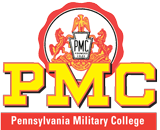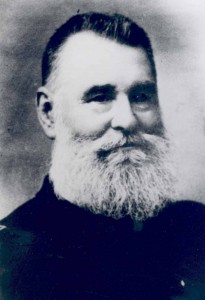
Theodore Hyatt
1857 – 1887
Theodore Hyatt made a commanding appearance. He was tall and physically striking. Born in Westchester County, New York, his formative years were spent on a farm. As a youth he attended the local district school. With the help of the local Presbyterian minister, Hyatt was tutored and entered Union College as a sophomore in 1846. In 1847 he transferred to Princeton University where he graduated in 1849.
After graduation, Hyatt accepted the invitation of Reverend S.R. Wynkoop to teach at the parochial school of the local Presbyterian Church in Wilmington, Delaware. Hyatt purchased the boarding school of Samuel Alsop, which had for years been guided by John Bullock. In 1857 the school was chartered as the Delaware Military Academy by the State.
Starting in 1885, Hyatt suffered greatly from stones, which had formed inside his organs. Although he continued to attend to his duties, he had to rest in bed for a part of each day. In December 1887 his only recourse was an operation. Despite his strong constitution, his heart was unable to recover from the shock of the operation. Surrounded by family Colonel Hyatt, “the scholar and teacher, the generous citizen, the faithful, earnest Christian, passed quietly and calmly through the shadow of death into life, from arduous labor to glorious reward.”
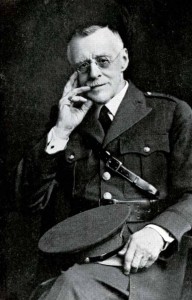
Charles Eliot Hyatt
1888 – 1930
Charles Hyatt was born in Wilmington, Delaware, in 1851. He was eleven years old when the Delaware Military Academy moved to West Chester. In 1872 he graduated from PMA with a degree in Civil Engineering. Following graduation, Hyatt became an instructor in mathematics, elocution and tactics at PMA. In 1873 he was appointed adjutant, and in 1876 treasurer and professor of rhetoric. In 1881 he became vice-president.
Following the death of his father, the Board of Trustees elected Hyatt as President and Commandant. Although the traditions of General Hyatt continued, Charles Hyatt brought a different style of leadership. His colleagues commented that He … has incorporated many of the best of the progressive elements in college life. The colonel is keenly and earnestly interested in the welfare of every student in the college, and shows it by his devotion to the office of president.
As news of his passing reached the PMC community, the expressions of sympathy arrived from every state in the Union.
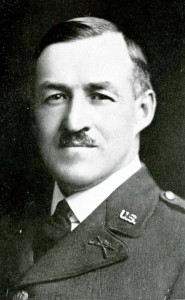
Frank Kelso Hyatt
1930 – 1952
Hyatt had been born at PMC, reportedly in Old Main, in 1886. He enrolled at PMC in 1902, but transferred to Swarthmore College in the winter of 1903-04. There he graduated with the degree of B.S. in Civil Engineering in 1907. He returned to PMC as a mathematics instructor and soon became vice-president and treasurer of the school in 1917. In this capacity, he became responsible for the business affairs of the PMC.
1910 began Hyatt’s long association with the Pennsylvania National Guard. He organized a troop and was made Captain. During World War I, he organized a Citizen’s Military Corps and helped train hundreds of men on the parade grounds of PMC. In 1943 Hyatt encouraged the Army to send PMC men to complete their college education while they remained in the army.
As a youth, Hyatt had a natural ability as a horseman. Under the guidance of U.S. cavalry officers stationed at the college, he became one of the country’s most outstanding horsemen. He became an active polo enthusiast and in the Philadelphia and New York area and was an executive officer of the U.S. Indoor Polo Association. Under his tutelage, the PMC polo teams were successful and nationally recognized.
When his father, Charles E. Hyatt unexpectedly died from a heart attack in 1930, the Board of Trustees elected Frank K. Hyatt as President and Commandant of PMC.
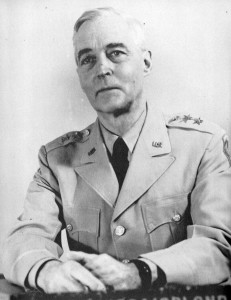
Edward E. MacMorland
1953 – 1959
Since 1862 PMC had been owned and operated by a member of the Hyatt family. With his health failing, Colonel Frank Kelso Hyatt retired as President of PMC and became the first President Emeritus of Pennsylvania Military College. The Board of Trustees established a selection committee that after nearly a year’s search, selected Major General Edward E. MacMorland as the new President.
MacMorland’s experience as a professional soldier and administrator made him well qualified to be President. Born in 1892, he graduated from the University of Missouri in 1913 earning a Master of Arts degree. His 37-year career in the military began in 1916 with an appointment to the coast artillery corps. His career saw him in the service of his country around the world. In 1952, he was made Chief of the General Purchasing Division of the newly organized U.S. Army in Europe.
He wore the Purple Heart for wounds received in Northern Russia in World War I, the British Distinguished Service Order, the Legion of Merit with an oak leaf cluster and the Army Commendation Ribbon. For his assistance to the British in World War lI, he was awarded the Order of the British Empire. (Commander).
In his inaugural address to the Corps of Cadets and a thousand spectators in 1954, MacMorland stressed that “Pennsylvania Military College is unique” and the development of leaders is our primary mission.”
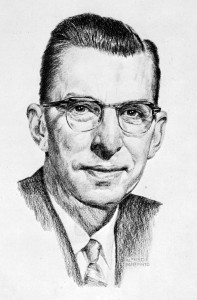
Clarence R. Moll
1959 – 1972
Clarence Moll was born in Chalfont, Pennsylvania, in 1913. He received a bachelor of science in education from Temple University in 1934, followed by a master’s degree in education three years later. He earned his Ph.D. in higher education from New York University in 1955.
From 1935 to 1942, Moll taught physics, chemistry, and science at several high schools in New Jersey and Pennsylvania. In 1943, Moll left a teaching position with the Navy to join Pennsylvania Military College as an associate professor of physics and engineering. In 1946 Moll assumed the duties of Headmaster of the Pennsylvania Military Prep School and a year later became the Dean of Admissions and Student Personnel. In 1956, Moll became a vice president of PMC.
In 1959 he was selected to succeed Major General Edward E. MacMorland as president of Pennsylvania Military College. Moll’s tenure would result in the disbandment of the Corps of Cadets.
